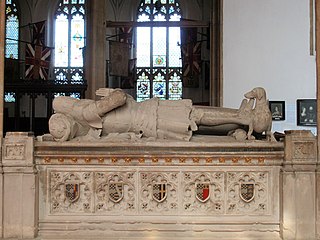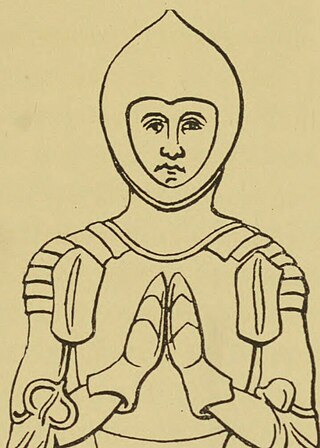
Thomas of Woodstock, Duke of Gloucester was the fifth surviving son and youngest child of King Edward III of England and Philippa of Hainault.
John Holland, 1st Duke of Exeter, 1st Earl of Huntingdon, KG, of Dartington Hall in Devon, was a half-brother of King Richard II (1377–1399), to whom he remained strongly loyal. He is primarily remembered for being suspected of assisting in the downfall of King Richard's uncle Thomas of Woodstock, 1st Duke of Gloucester (1355–1397) and then for conspiring against King Richard's first cousin and eventual deposer, Henry Bolingbroke, later King Henry IV (1399–1413).

Richard Fitzalan, 3rd Earl of Arundel, 8th Earl of Surrey was an English nobleman and medieval military leader and distinguished admiral. Arundel was one of the wealthiest nobles, and most loyal noble retainer of the chivalric code that governed the reign of Edward III of England.

Richard Fitzalan, 4th Earl of Arundel, 9th Earl of Surrey, KG was an English medieval nobleman and military commander.
Elizabeth de Mowbray, Duchess of Norfolk was an English noblewoman and the wife of Thomas Mowbray, 1st Duke of Norfolk.

Sir Robert Drury was an English knight, Lord of the Manor of Hawstead, Suffolk, and Knight of the Body to Kings Henry VII and Henry VIII. As a politician he was Knight of the Shire for Suffolk, Speaker of the House of Commons, and Privy Councillor. He was also a barrister-at-law. His London townhouse was on the site of today's Drury Lane.

Thomas Chaucer was an English courtier and politician. The son of the poet Geoffrey Chaucer and his wife Philippa Roet, Thomas was linked socially and by family to senior members of the English nobility, though he was himself a commoner. Elected fifteen times to the Parliament of England, he was Speaker of the House of Commons for five parliaments in the early 15th century.
Sir Richard Waldegrave was an English knight and Member of Parliament, who served as Speaker of the House of Commons from November 1381 to February 1382.
John de Vere, 12th Earl of Oxford, was the son of Richard de Vere, 11th Earl of Oxford, and his second wife, Alice Sergeaux (1386–1452). A Lancastrian loyalist during the latter part of his life, he was convicted of high treason and executed on Tower Hill on 26 February 1462.

William Bourchier, 1st Count of Eu, was an English knight created by King Henry V 1st Count of Eu, in Normandy.

Richard de Vere, 11th Earl of OxfordKG was the son and heir of Aubrey de Vere, 10th Earl of Oxford. He took part in the trial of Richard, Earl of Cambridge, and Lord Scrope for their part in the Southampton Plot, and was one of the commanders at Agincourt in 1415.

Sir Thomas Kitson was a wealthy English merchant, Sheriff of London, and builder of Hengrave Hall in Suffolk.
Sir John Spring, of Lavenham, Buxhall, Hitcham, and Cockfield, Suffolk, was an English merchant and politician.

Sir Maurice Russell, JP of Kingston Russell, Dorset and Dyrham, Glos. was an English gentleman and knight. He was a prominent member of the Gloucestershire gentry. He was the third but eldest surviving son and heir of Sir Ralph Russell (1319–1375) and his wife Alice. He was knighted between June and December 1385 and served twice as Knight of the Shire for Gloucestershire in 1402 and 1404. He held the post of Sheriff of Gloucestershire four times, and was Coroner and Justice of the Peace, Tax Collector and Commissioner of Enquiry. His land holdings were extensive in Gloucestershire, Somerset, Dorset, Berkshire and Buckinghamshire. He was descended from an ancient line which can be traced back to 1210, which ended on the death of his son Thomas, from his second marriage, as a young man without male issue. Most of his estates, despite having been entailed, passed at his death into the families of his two daughters from his first marriage.

Sir Hugh I Courtenay, of Haccombe in Devon, was Sheriff of Devon for 1418/19 and was thrice elected knight of the shire for Devon in 1395, 1397 and 1421. He was a grandson of Hugh de Courtenay, 2nd/10th Earl of Devon (1303–1377), was the younger brother of Edward de Courtenay, 3rd/11th Earl of Devon (1357–1419), "The Blind Earl", and was the grandfather of Edward Courtenay, 1st Earl of Devon (d.1509), KG, created Earl of Devon in 1485 by King Henry VII. He was the link between the senior line of the Courtenay Earls of Devon made extinct following the Battle of Tewkesbury in 1471 and the post-Wars of the Roses creation of a new Earldom for his grandson made in 1485 by King Henry VII.
Sir William Drury was the son and heir of Sir Robert Drury, Speaker of the House of Commons. He was a Member of Parliament and a Privy Councillor. His name appears in the Ellesmere manuscript of Chaucer's Canterbury Tales.
Sir Robert Drury of Hedgerley and Chalfont St Peter, Buckinghamshire, was the second son of Sir Robert Drury, Speaker of the House of Commons, and was the father of Sir Robert Drury (1525–1593), Sir William Drury, and Sir Drue Drury.

Sir Thomas Tuddenham was an influential Norfolk landowner, official and courtier. He served as Steward of the Duchy of Lancaster, and Keeper of the Great Wardrobe. During the Wars of the Roses he allied himself with the Lancastrian side, and after the Yorkist victory in 1461 was charged with treason and beheaded on Tower Hill on 23 February 1462.

Sir John Howard, of Wiggenhall and East Winch, in Norfolk, England, was a landowner, soldier, courtier, administrator and politician. His grandson was John Howard, 1st Duke of Norfolk, the great-grandfather of two queens, Anne Boleyn and Katherine Howard, two of the six wives of King Henry VIII.
Sir Robert Chalons was an English courtier, soldier, administrator and politician from Devon.












